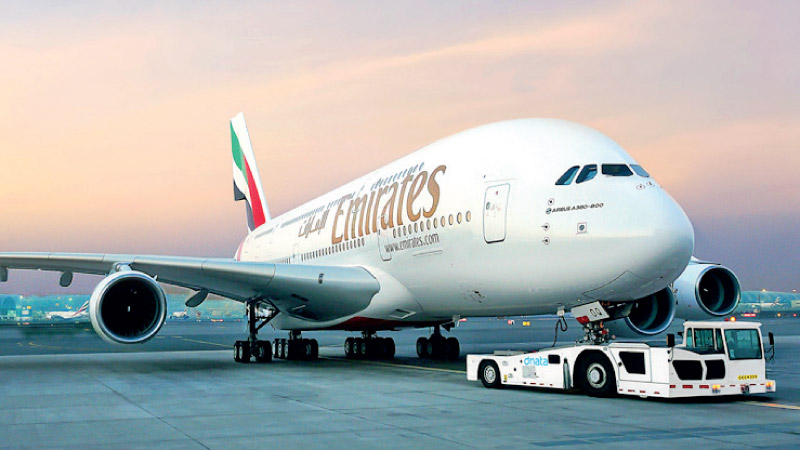Sunday Feb 22, 2026
Sunday Feb 22, 2026
Wednesday, 16 June 2021 00:50 - - {{hitsCtrl.values.hits}}

The Emirates Group yesterday revealed its first year of loss in over 30 years caused by a significant drop in revenue, fully attributed to the impact of COVID-19 related flight and travel restrictions throughout its entire financial year 2020-21.
The Group posted a loss of $ 6 billion for the financial year ended 31 March 2021 compared with a $ 456 million profit for last year. The Group’s revenue was $ 9.7 billion down by 66%. Cash balance was $ 5.4 billion, down 23% mainly due to weak demand caused by the various pandemic related business and travel restrictions across all of the Group’s core business divisions and markets.
Chairman and CEO Sheikh Ahmed bin Saeed Al Maktoum said: “The COVID-19 pandemic continues to take a tremendous toll on human lives, communities, economies, and on the aviation and travel industry. In 2020-21, Emirates and dnata were hit hard by the drop in demand for international air travel as countries closed their borders and imposed stringent travel restrictions.
“Our top priorities throughout the year were: the health and wellbeing of our people and customers, preserving cash and controlling costs, and restoring our operations safely and sustainably. Emirates received a capital injection of AED 11.3 billion ($ 3.1 billion) from our ultimate shareholder, the Government of Dubai, and dnata tapped on various industry support programs and availed a total relief of nearly AED 800 million in 2020-21. These helped us sustain operations and retain the vast majority of our talent pool. Unfortunately, we still had to make the difficult decision to resize our workforce in line with reduced operational requirements.”
For the first time in the Group’s history, redundancies were implemented across all parts of the business. As a result, the Group’s total workforce reduced by 31% to 75,145 employees, representing over 160 different nationalities.
Keeping a tight control on costs, across the Group, financial obligations were restructured, contracts renegotiated, processes examined and operations consolidated. The various cost reduction initiatives returned an estimated saving of AED 7.7 billion during the year.
In 2020-21, the Group collectively invested $ 1.3 billion in new aircraft and facilities, the acquisition of companies, and the latest technologies to position the business for recovery and future growth. It also continued to invest resources towards environmental initiatives, as well as supporting communities and incubator programs that nurture talent and innovation to drive future industry growth.
Sheikh Ahmed said: “No one knows when the pandemic will be over, but we know recovery will be patchy. Economies and companies that entered pandemic times in a strong position, will be better placed to bounce back. Until 2020-21, Emirates and dnata have had a track record of growth and profitability, based on solid business models, steady investments in capability and infrastructure, a strong drive for innovation, and a deep talent pool led by a stable leadership team. These fundamental ingredients of our success remain unchanged. Together with Dubai’s undiminished ambitions to grow economic activity and build a city for the future, I am confident that Emirates and dnata will recover and be stronger than before.”
“In the year ahead, we will continue to adopt an agile approach in responding to the dynamic marketplace. We aim to recover to our full operating capacity as quickly as possible to serve our customers, and to continue contributing to the rebuilding of economies and communities impacted by the pandemic,” Al Maktoum added.
Due to ongoing pandemic-related flight and travel restrictions, the airline reported a loss of $ 5.5 billion after last year’s $ 288 million profit, and a negative profit margin of 65.6%. This includes a one-time impairment charge of $ 193 million mainly relating to certain aircraft which are currently grounded and are not expected to return to service before their scheduled retirement within the next financial year.
Emirates’ total passenger and cargo capacity declined by 58% to 24.8 billion ATKMs at the end of 2020-21, due to pandemic related flight and travel restrictions including a complete suspension of commercial passenger services for nearly eight weeks as directed by the UAE Government from 25 March 2020.
During the year, Emirates reactivated its strategic codeshare partnership with flydubai, and entered into agreements with new partners TAP Air Portugal, FlySafair, and Airlink in South Africa, to expand connectivity for its customers.
From zero scheduled passenger flights at the start of the financial year, to operations in over 120 destinations by 31 March 2021, Emirates has shown its ability to adapt and respond to challenges, and the resilience of its people and business model.
Emirates carried 6.6 million passengers (down 88%) in 2020-21, with seat capacity down by 83%. The airline reports a Passenger Seat Factor of 44.3%, compared with last year’s passenger seat factor of 78.5%; and a 48% increase in passenger yield to 38.9 fils (10.6 US cents) per Revenue Passenger Kilometre (RPKM), due largely to a favourable route mix, fares and continued healthy demand for premium seats. Seat load factor and yield results cannot be compared against the previous year’s performance due to the unusual pandemic situation.